Photographs: Reuters
Former Pakistan President Pervez Musharraf has expressed his bitter resentment toward United States President Barack Obama and his administration for developing a strategic partnership with India while using Pakistan only for its strategic convenience. While speaking at the Atlantic Council, a Washington, DC-based think tank, Musharraf lashed out against Obama's decision not to visit Pakistan during his recent visit to Asia, the first stop of which was India where he spent three days.
The former dictator-turned-president also blasted India for everything from human rights violations in Kashmir to fomenting terror against Pakistan from its (India's) consulates in Afghanistan.
The erstwhile military dictator said that the US obviously wanted to make a play for the defence market in India, reportedly worth $45 billion in arms purchases.
Reportage: Aziz Haniffa in Washington, DC
'President Obama doesn't even talk of Kashmir'
Image: US President Barack Obama with Prime Minister Manmohan SinghPhotographs: Reuters
"I don't believe in Pakistan being Indo-centric and I do believe in the importance of bilateral relationships," he said with regard to Obama's visit to India, adding, "I don't want to talk much about it."
But he went on anyway, "If the US president wants to go to India, he has all the right to do so. But if Pakistan is a strategic partner, if Pakistan has strategic significance, and Pakistan is suffering because of so many bomb blasts, hundreds if not thousands of people dead, the Pakistani army has suffered, 2,500 dead, Pakistan's ISI has suffered, about 300 dead, and then we had these floods -- massive floods, unprecedented and so many dead, I thought President Obama should have shown some concern for this small strategic partner and visited Pakistan."
"And there was also no mention of Kashmir," he said. "I couldn't explain that."
Musharraf asserted that Kashmir "is the root," of the imbroglio in South Asia, "and that is my concern that President Obama goes (to India) and doesn't even talk of Kashmir."
'One expects concern for Pakistan'
Image: A deserted street in SrinagarPhotographs: Reuters
Musharraf acknowledged that he could understand India's aversion to third party intervention or mediation and "yes, indeed, it should not be involved and we should resolve Kashmir bilaterally, which we were doing during my time and we were near a solution. But certainly, from the sole superpower, one expects concern for Pakistan, if indeed it's a strategic ally of importance."
The former leader, now living in exile in the United Kingdom since resigning in 2008, warned that Pakistan-based militant groups could once again join in the fighting against Indian troops in Kashmir.
He recalled, "In 1989, when Kashmir erupted -- freedom struggle erupted in the Indian part of Kashmir -- dozens of mujaheddin groups sprung up within Pakistan, and thousands of people were prepared, volunteering to join, to go to India to help Kashmiris fight against the Indian army."
'Why is the Pakistani bomb only an Islamic bomb?'
Image: Local Lashkar members in a show-of-force in Khar, PakistanPhotographs: Adrees Latif / Reuters
He also lamented the fact that Pakistan's nuclear weapons programme was always looked upon by suspicion. "(It's called) The rogue element, the rogue nuclear state, rogue army, Islamic bomb."
"I don't know why the Indian bomb is not a Hindu bomb or the Israeli bomb is not a Jewish bomb. Why is the Pakistani bomb only an Islamic bomb? I don't understand this logic," he said.
But, Musharraf argued that Pakistan's nuclear weapons arsenal exists because of the 'existential threat' from India.
'Why are Pakistan's nuclear assets disturbing the world'
Image: Pakistani soldiers stand near nuclear-capable ballistic missile Gauri at an undisclosed locationPhotographs: Reuters
"Pakistan's nuclear or strategic capability is an existential compulsion, which is not the case with India," he said. "And, I don't understand the logic or no Pakistani will ever understand the logic of why Pakistan's nuclear assets are disturbing the world."
Musharraf declared, "Our nuclear or strategic assets are the pride of every man walking the streets of Pakistan. So, any indication of negativism coming from abroad, a threat coming on the strategic capability of Pakistan, is viewed extremely seriously by every individual Pakistani."
When queried on whether he believed the main existential threat to Pakistan was from India, he made no bones about it, saying, "It is to do with India, certainly. Indian forces today are based on 33 infantry divisions, 25 of them are oriented towards Pakistan border."
'The Indian army came on to the borders of Pakistan'
Image: The Indian Navy's new warship, a missile destroyer in the Project-15 alpha classMusharraf said, "And, when there are incidents like the attack on the Parliament, in my time, the whole (Indian) army came on to the borders of Pakistan, and therefore, we had to move our army and there was a war situation that developed. So, what do you expect Pakistan to do? It's an existential threat."
He said when incidents like the Parliament attack takes place, "then the politicians in India, are crying for punishment on Pakistan, attacking Pakistan, etc. etc."

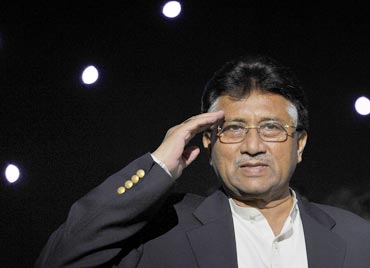
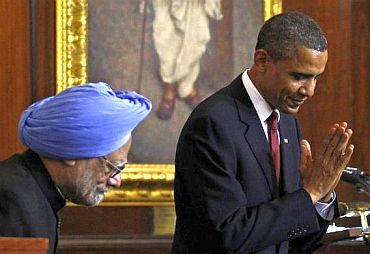
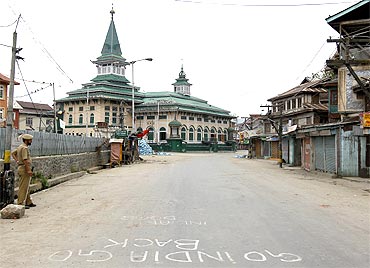
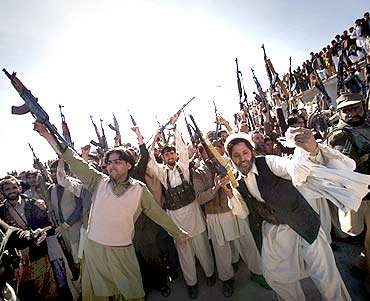
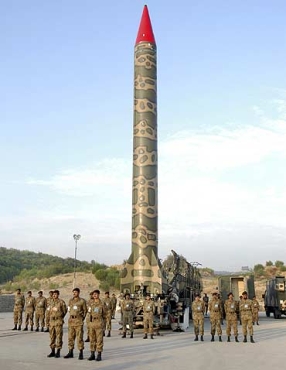
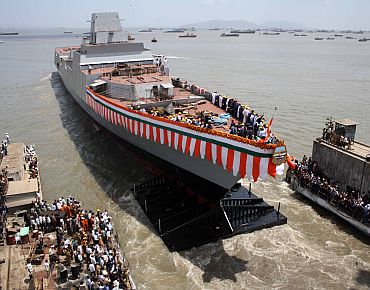
article